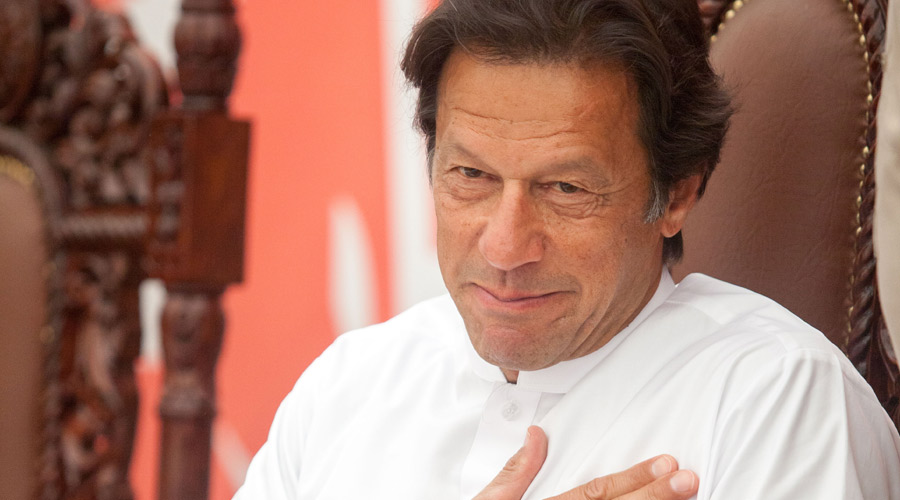On April 3, the National Assembly of Pakistan was all set to vote on the no-confidence motion against Imran Khan as prime minister. Instead, we saw the Constitution being subverted by a sitting government. The country was left with a huge constitutional crisis at the hands of a civilian government. History had been made but for all the wrong reasons.
Here’s a quick recap. The former deputy-Speaker, Qasim Khan Suri, ‘disallowed’ the vote citing Article 5 of the Constitution, alleging that there was a plan to oust the then Pakistan Tehreek-e-Insaf government through a foreign conspiracy. Khan, as the then prime minister, advised the president, Arif Alvi, to dissolve the National Assembly. The president followed Khan’s orders. The alleged conspiracy was first talked about in a rally on March 27 by Khan who waved a letter, claiming it to be evidence of a foreign conspiracy against his government. It later turned out to be a cable/memo from Pakistan’s ambassador to the United States of America who had written about a meeting with a US official and mentioned the vote of no-confidence. It also talked about how there would be consequences if Khan remained in power. A statement by the National Security Committee “expressed grave concern at the communication, terming the language used by the foreign official as undiplomatic”. The statement also concluded that it amounted to “blatant interference in the internal affairs of Pakistan by the country in question”. A strong démarche was also issued to the said country. But there was no mention of any conspiracy. Yet Khan and his government used the foreign conspiracy narrative to build a case to explain the reason for his ouster.
The Supreme Court of Pakistan took up the issue the same day on account of the constitutional crisis. A five-member bench heard the case involving the Opposition parties as well as the PTI government on what had transpired and why. On April 7, the top court declared that the ruling by the deputy-Speaker was contrary to the Constitution and was, therefore, set aside. The historic verdict was unanimous. The court ordered that the voting should now take place on April 9. It was a long day. Hours passed because of some extremely long speeches in the National Assembly by the government to stall the vote while the Opposition demanded that the vote should take place. The Supreme Court decided to open at midnight because of the impasse in the assembly while the Islamabad High Court also opened at night to take up a petition to restrain the prime minister from de-notifying the army chief. After a lot of drama, the Speaker of the National Assembly stepped down and a vote was finally allowed to take place. Khan was voted out as prime minister of Pakistan with 174 votes against him. The Opposition needed 172 votes.
As a result, Shehbaz Sharif was elected as the 23rd prime minister of Pakistan. Sharif is the younger brother of the former prime minister, Nawaz Sharif, who had gone to London for his medical treatment in November 2019 but has not returned since. Shehbaz’s federal cabinet finally took oath on April 19, after almost a week of being sworn in as the new prime minister. The president of Pakistan did not administer oaths to either Shehbaz or his cabinet as he has reportedly not been feeling well lately. Many are questioning whether the president should hold on to his position if he is not going to perform his constitutional duties just because he is a member of Khan’s party. Analysts believe that he will continue to create hurdles for this government as his own party is now out of power.
Khan is now out on the streets in the major cities of Pakistan demanding early elections. People have come out in huge numbers to support him. Twitter trends reflect how his conspiracy narrative is being bought by his supporters. Khan has continued his foreign conspiracy mantra even after a press conference was held by the director-general of the Inter-Services Public Relations denying everything that Khan had claimed regarding a conspiracy. Khan has definitely re-galvanized his supporters on an alleged conspiracy that was never there. Instead of accepting his constitutional defeat gracefully when he could not manage the numbers, reflecting on why his government performed so poorly when it comes to the economy, introspecting on the attitude that led to his allies and even some party members to leave his side, Khan chose to deflect attention with the help of false allegations. He blamed everyone — the US, the Opposition, the media, the judiciary and some others — but himself for his ouster. It is also alarming that his followers believe that those political parties that got a handsome percentage of the vote in the last general elections are all ‘foreign agents’ and ‘traitors’ and that these politicians and institutions such as the judiciary are part of an international conspiracy to topple Khan’s government because of his ‘independent foreign policy’. The way Khan is now invoking religion and patriotism in mainstream politics, calling the new set-up an ‘imported government’, is extremely dangerous because it is an act of incitement to violence. We have seen too much polarization in the country in recent years and this intolerance has to be countered. Karl Popper’s ‘paradox of tolerance’ states that if a society is tolerant without limit, its ability to be tolerant is eventually seized or destroyed by the intolerant. Thus, a society must retain the right to be intolerant of intolerance. In Pakistan’s case, our society must retain the right to be intolerant of incitement to violence and hate speech.
The next few months are crucial for Pakistan as we will need a new roadmap for our economy and our foreign policy, both of which have been damaged by the previous regime.
Mehmal Sarfraz is a journalist based in Lahore; mehmal.s@gmail.com










